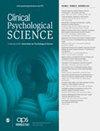多基因指数是否能捕捉到对儿童外化行为问题的 "直接 "影响?两个纵向出生队列的家庭内分析
IF 4.1
2区 医学
Q1 PSYCHIATRY
引用次数: 0
摘要
自我控制能力的缺失会表现为外化行为(如攻击、破坏规则),从而产生深远的负面影响。长期以来,研究人员一直对测量儿童外化行为的遗传风险感兴趣,以便为早期识别和干预提供依据。利用环境风险纵向双胞胎研究(862 对双胞胎)和千禧队列研究(2824 对亲子三人组)(英国的两个纵向队列)的数据,我们利用分子遗传数据和家庭内设计来检验与外化行为的遗传关联,这些关联不受环境影响的共同来源的影响。我们发现,根据以往对成人自控行为研究中发现的基因变异计算出的多基因指数(PGI),在采用严格的家庭内设计进行评估时,可以捕捉到基因对儿童和青少年外化问题的直接影响(βs = 0.13-0.19 跨越发育过程)。外化行为的 PGI 可以有效地加强对自我控制能力发展的心理学研究。本文章由计算机程序翻译,如有差异,请以英文原文为准。
Do Polygenic Indices Capture “Direct” Effects on Child Externalizing Behavior Problems? Within-Family Analyses in Two Longitudinal Birth Cohorts
Failures of self-control can manifest as externalizing behaviors (e.g., aggression, rule-breaking) that have far-reaching negative consequences. Researchers have long been interested in measuring children’s genetic risk for externalizing behaviors to inform efforts at early identification and intervention. Drawing on data from the Environmental Risk Longitudinal Twin Study ( N = 862 twins) and the Millennium Cohort Study ( N = 2,824 parent–child trios), two longitudinal cohorts from the United Kingdom, we leveraged molecular genetic data and within-family designs to test for genetic associations with externalizing behavior that are not affected by common sources of environmental influence. We found that a polygenic index (PGI) calculated from genetic variants discovered in previous studies of self-controlled behavior in adults captures direct genetic effects on externalizing problems in children and adolescents when evaluated with rigorous within-family designs (βs = 0.13–0.19 across development). The PGI for externalizing behavior can usefully augment psychological studies of the development of self-control.
求助全文
通过发布文献求助,成功后即可免费获取论文全文。
去求助
来源期刊

Clinical Psychological Science
Psychology-Clinical Psychology
CiteScore
9.70
自引率
2.10%
发文量
35
期刊介绍:
The Association for Psychological Science’s journal, Clinical Psychological Science, emerges from this confluence to provide readers with the best, most innovative research in clinical psychological science, giving researchers of all stripes a home for their work and a place in which to communicate with a broad audience of both clinical and other scientists.
 求助内容:
求助内容: 应助结果提醒方式:
应助结果提醒方式:


